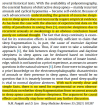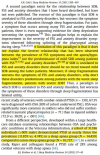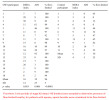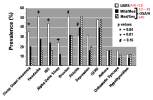Hi
@nataliezzz I have not had the time to go through everything that is written here, but I had a look at the study you shared as you mentioned it several times:
https://link.springer.com/article/10.1007/s11325-010-0386-8.
It would appear the protocol was never preregistered anywhere, at least it is not mentioned in the paper as far as I can tell, can you confirm this? If that is the case do you know more about the recruitment process (which typically might bias the study itself, people with sleep problems are more likely to enrol in a sleep related study without that necessarily having anything to do with GWI etc).
There is an additional risk of bias in this study that is of concern and for me it's hard to think of a reason any serious researcher would engage in such a practice: The data from the GWI group was analysed unblindely by the people running the study before recruitment of the control group was even completed (and certainly not analysed). This to me appears to be an extremely serious concern for risk of bias (especially with there being seemingly no prespecified protocol and/or outcome measures), do you see any reason why one should approach a study in such a fashion (the later blinded analysis that was performed wouldn't counter the bias already introduced)? I think most people would stop reading the study now, maybe that's why the work has received any attention.
According to Table 1 pwGWI are essentially more ill than HC's (as one would suspect), however according to Table 2 the authors found no meaningful differences in sleep patterns between the groups that would pass a strongly adjusting multiplicity test (the p-values mentioned are all non-adjusted, so it's impossible to say what's just a chance findinging especially with there being no prespecified protocol). No relationship between GWI symptoms and any sleep patterns is analysed. You mentioned to have a look at the p-values but none of those are adjusted. The only p-value worth mentioning is that of "Arousals/hour". It wouldn't pass a strongly adjusted test but could pass a weaker one, but given that there is no prespecified protocol even that isn't clear.
Table 3 suggests a group association between limited flow and GWI status of the 2 groups. That in turn means that the authors provide no evidence that limited flow impacts any of the other parameters, nor any evidence to suggest it impacts symptoms of GWI, do you agree with this?
Hi
@EndME , thank you for actually taking a look at it and making some of these critiques, I appreciate that. I plan to go back and read it again in detail so I can respond to them. For right now, I am just going to try to convey why I think flow limitation is the relevant factor to focus on when discussing the strength of the evidence this paper (even though the authors did not provide a rationale for why it would be when they wrote it). If people want to have a productive discussion about this,
they must try to develop an understanding of the stress response to inspiratory flow limitation (IFL) theory of sleep-disordered breathing (doesn't mean you have to agree with the theory, but you can't argue against a theory you haven't tried to understand), otherwise these discussions will go nowhere.
Sleep fragmentation by (apnea/hypopnea/RERA-related) arousals is not the primary cause of sleepiness/fatigue in sleep-disordered breathing patients, so there is no reason to focus on arousals as the relevant factor. It is well recognized that the majority of people with obstructive sleep apnea (OSA) - who have arousals related to apneas and hypopneas - are asymptomatic, so arousals simply can't be the primary cause of symptoms or everyone with OSA would be symptomatic.
Healthy controls without OSA have plenty of arousals too.
The data from the first large population-based sleep studies (
Sleep Heart Health Study,
Wisconsin Sleep Cohort Study) show that snoring (which almost always = inspiratory flow limitation [IFL], though many people have IFL without audible snoring) is associated with sleepiness independent of OSA (apnea hypopnea index [AHI] ≥ 5) and that
arousals are not the cause of snoring-related sleepiness (by the way, almost everyone with OSA snores, so which is more associated with sleepiness: OSA, or snoring?). There does seem to be a contribution to daytime sleepiness from AHI/arousals
when you get into the severe OSA range (AHI >45), but it seems modest and perhaps only captured my multiple sleep latency testing and not self-report measures as many people with an AHI >45 report no significant daytime sleepiness/fatigue. I have summarized the evidence re: this in detail in this Bluesky thread below (sorry, but it would be impossible for me to convey it all here):
The authors of the GWI study did not understand the importance of IFL when they conducted this study (Dr. Gold just noticed "functional somatic syndrome" symptoms in many of his UARS patients, so he decided to investigate the presence of sleep-disordered breathing in "functional somatic syndrome" patients; he developed his theory about the stress response to IFL driving the sleepiness/fatigue and other symptoms in sleep-disordered breathing patients based on the finding of this study and others). So in order to consider the relevance of IFL, you need to take into account the evidence from these large population-based re: snoring (again, snoring almost always = IFL).
So to sum up the findings: There’s a handful of negative findings and one association between GWI status and limited flow (without any way of knowing how many things had been tested for). Unfortunately, there isn't a more sophisticated analysis of this data. This is very unfortunate as the authors claim a relationship between arousals and apneas, hypopneas, and mild inspiratory airflow limitation but provide 0 evidence for such a relationship as they didn’t even analyse whether there is any relationship it all, which makes the claim rather dubious itself (especially when arousals doesn’t pass an adjusted test).
I'm not sure what you mean by "the authors claim a relationship between arousals and apneas, hypopneas and mild inspiratory airflow limitation." A relationship to GWI? Like I said, yes, the data from this study indicate a relationship between IFL and GWI (we can simply ignore the apneas and hypopneas as they are largely irrelevant, as I have argued above).
If anything a first and naive look at the data would suggest that there is no relationship (all pwGWI have limited flow and healthy controls don't but they look fairly similar in terms of arousals at least from the very limited data the authors provide with several HCs having the same amount of arousals as pwGWI).
Yes, you can't just come at this with a "naive look at the data" (you are literally just writing off the finding of "
all pwGI have limited flow and healthy controls don't" - which is the relevant finding here - as irrelevant); you have to take the time to develop an understanding of the larger theory for how IFL may be related to not only fatigue, sleepiness and cognitive dysfunction (all well established symptoms of both UARS/OSAS and disorders like GWI, ME/CFS, fibromyalgia), but also symptoms such as body pain and IBS associated with "chronic complex illnesses" (which if you read my full OP you will see there is supporting evidence for).
I'm trying to understand how you claim causality from this especially since the authors themselves mention “However, a difference in sleep-disordered breathing between groups does not establish that sleep-disordered breathing contributes to the symptoms of GWI. Moreover, even if sleep-disordered breathing does contribute to the symptoms of GWI, our comparing a group with three symptoms to a control with no symptoms does not allow us to determine which of the symptoms of GWI are related to sleep-disordered breathing”. Surely you didn’t confuse correlation with causation, so could you please help me understand your thought process?
The findings from the CPAP treatment study (which came after the study quoted above) are also relevant. 18 GWI patients had 96%±5 of their breaths flow limited while 11 age/BMI-matched asymptomatic Gulf War vets had 36±25% of their breaths flow limited (p = <.0001). According to Dr. Gold's theory, a stress response to IFL is the primary driver of symptoms such as fatigue, pain, cognitive dysfunction, insomnia, etc. in "chronic complex illness" patients, so according to this theory, we should see the symptoms of GWI improve with a treatment that ameliorates IFL. The GWI patients treated with CPAP (which was specifically titrated to eliminate IFL) experienced subjective improvements in the symptoms of GWI (fatigue, pain, cognitive dysfunction, etc.) which were highly and significantly correlated with changes in an objective finding (decreased sleep stage shifts) in all patients (GWI patients on sham CPAP did not experience decreased sleep stage shifts and got slightly worse).
I have provided a screenshot below with an explanation of why I believe it does not make sense to claim that UARS/OSAS is just a comorbidity worsening the symptoms of GWI (FSS = "functional somatic syndromes," "anxiety disorders" refers to research re: sleep-disordered breathing & PTSD), and in my OP I have a link to a thread explaining why people with "chronic complex illnesses" typically only experience partial symptom improvement rather than cure on CPAP (likely because CPAP also acts as a stressor).
Measuring limited flow in GWI would be a fairly simply easy and cheap process. Have there been any other such findings in GWI?
No (but if you see anything of value here once you have read through all of the information I shared [not just this one study], maybe you could help call for such a study!). Like I have repeatedly said in this thread, sleep medicine ignores the fact that the sleep fragmentation paradigm of sleep-disordered breathing literally makes no sense, with eminent sleep doctors like Naresh Punjabi claiming that "there is no need for experimental or even observational data on whether sleep fragmentation from recurrent arousals in sleep apnea causes daytime sleepiness." They do go on to make
some weak arguments in that paper as I discuss here. Sleep medicine rejects the stress response to IFL paradigm without actually meaningfully engaging with the evidence (you can see an example of a doctor in this thread doing the exact same thing by the way), despite the fact that their own data from the first large population-based sleep studies showed that snoring - not sleep fragmentation by arousals - appears to be the primary driver of sleepiness in sleep-disordered breathing patients.
Thanks again for meaningfully engaging with me on it. I plan to take the time to look into the critiques of the GWI study you have raised, so I hope you will take some time to read through my OP and try to develop an understanding of the stress response paradigm of sleep-disordered breathing.






